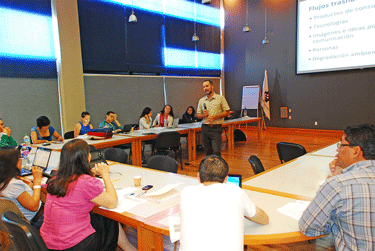Through global health efforts, 'We have the opportunity to impact the health of millions of people every day'
 Dr. Jim Thrasher answers questions during a course that he
Dr. Jim Thrasher answers questions during a course that he
and Dr. Ed Frongillo taught in Mexico this summer
at the National Institute of Public Health.
September 11, 2013
(Editor's Note: The Arnold School of Public Health is developing a Web presence on our global health initiatives. We are seeking information about faculty research, education and outreach programs; student awards and research on the subject of global health, as well as study abroad and volunteer participation; and other success stories, including those from alumni. Please email Karen Petit, kpetit@mailbox.sc.edu, to share your information.)
"Improving people's health statewide … worldwide."
Since its founding in 1975, the Arnold School of Public Health has been dedicated to improving the health of children and adults in South Carolina, as well as nationally and internationally.
The Arnold School's international presence was seen more than 25 years ago during the early days of the HIV/AIDS epidemic when faculty members Dr. Donna Richter and Dr. Francisco Sy worked to establish HIV/AIDS prevention and education initiatives that could be used in the United States and abroad. Their work led to the establishment of the International Society for AIDS Education, for which Richter served in a variety of offices, including president in 1990.
Last year, the Arnold School and USC were hosts for the International Society of Environmental Epidemiology (ISEE). More than 800 epidemiologists representing 60 countries shared new discoveries in the field of environmental epidemiology – making the Arnold School, the University and the City of Columbia a "famously hot" place to be for scientists.
"Throughout the Arnold School's history, faculty, students and staff have been involved in education, research and outreach programs throughout the world," said Dr. Tom Chandler, dean of the Arnold School.
"Our many efforts underscore the commitment that the Arnold School established in the field of global health during its early years – efforts that have helped us prevent disease and save lives at home and around the world. These efforts are growing each year, and they are efforts that we can be proud of."
Dr. Jim Thrasher, an associate professor in the Department of Health Promotion, Education, and Behavior, is working to highlight the global health initiatives of the Arnold School.
"Increasingly the health problems facing children and adults in South Carolina and the rest of the United States are the same as in other countries, including in low- and middle-income countries," he said.
Recognized internationally for his research on tobacco policy and communications, Thrasher said that public health innovations in other countries can help enhance public health in the United States.
The international research, education and outreach programs being conducted by approximately 25 Arnold School faculty members has large-scale, public health impact as well, said Thrasher, an editor of the book "Warning Labels on Cigarette Packages in Latin America and the Caribbean."
Faculty engaged in international research include: Dr. Julius Fridriksson, Department of Communication Sciences and Disorders; Drs. Tom Chandler, Greg Hand, Jamie Lead and Sarah Rothenberg, Department of Environmental Health Sciences; Drs. Steve Blair (also Exercise Science), Eric Brenner, Nancy Fleischer, James Hébert, Angela Liese, Jihong Liu, Anwar Merchant and Myriam Torres, Department of Epidemiology and Biostatistics; Drs. James Carson, Mark Davis, Larry Durstine and Russell Pate, Department of Exercise Science; Drs. Deborah Billings, Edward Frongillo, Jim Thrasher, David Simmons and Robert Valois, Department of Health Promotion, Education, and Behavior, and Drs. Brian Chen, Mahmud Khan, Jan Probst and Sudha Xirasagar, Department of Health Services Policy and Management.
Their work is being conducted in Africa, Latin America, Europe, the Eastern Mediterranean, Southeast Asia and the Western Pacific.
Approximately 100 graduate students in the Arnold School come from other countries. Many of them are sponsored by key institutions and funding agencies, and many also receive funding from the Arnold School and the state.
In recent years, for example, Fulbright Program scholarships have funded the studies of Dien Anshari (Indonesia), Ebru Cayir (Turkey), Amira Osman (Israel) and Zaeem Ul Haq (Pakistan), HPEB; Naveed Sadiq (Pakistan), HSPM; and Azza Shoaibi (Palestine), EPI-BIOs. Salima Kasymova, HPEB, (Tajikistan) was awarded funding from the Open Society Foundations.
EPI-BIOS students received grants from the National Institutes of Health. They included Nitin Shivappa and Pallavi Balte (India) and Songfen Wang and Yubo Zou (China). Georges Nahhas (Lebanon) received funding from the American Diabetes Association.
HPEB students from the United States who traveled abroad for global health experiences include Kristin Van De Griend in Bangladesh and Jean-Marie Place in Mexico.
"These are just a few of the Arnold School students who have had global health experiences," said Thrasher.
"Many other students, including undergraduates, volunteer, study and work abroad to enhance their public health education," he said.
"The Arnold School is working to solve global health challenges in the 21st century by conducting critical research, as well as training the next generation of public health researchers, educators, policymakers and leaders. We have the opportunity to impact the health of millions of people every day," Thrasher said.



_01.jpg)
_02.jpg)